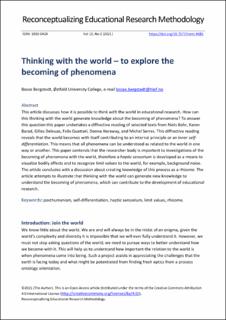| dc.contributor.author | Bergstedt, Bosse | |
| dc.date.accessioned | 2022-01-31T07:39:09Z | |
| dc.date.available | 2022-01-31T07:39:09Z | |
| dc.date.created | 2022-01-26T09:51:25Z | |
| dc.date.issued | 2021 | |
| dc.identifier.citation | Reconceptualizing Educational Research Methodology. 2021, 12 (2), 100-114. | en_US |
| dc.identifier.issn | 1892-042X | |
| dc.identifier.uri | https://hdl.handle.net/11250/2975782 | |
| dc.description.abstract | This article discusses how it is possible to think with the world in educational research. How can this thinking with the world generate knowledge about the becoming of phenomena? To answer this question this paper undertakes a diffractive reading of selected texts from Niels Bohr, Karen Barad, Gilles Deleuze, Felix Guattari, Donna Haraway, and Michel Serres. This diffractive reading reveals that the world becomes with itself contributing to an internal principle or an inner self-differentiation. This means that all phenomena can be understood as related to the world in one way or another. This paper contends that the researcher body is important to investigations of the becoming of phenomena with the world, therefore a haptic sensorium is developed as a means to visualize bodily affects and to recognize limit values to the world, for example, background noise. The article concludes with a discussion about creating knowledge of this process as a rhizome. The article attempts to illustrate that thinking with the world can generate new knowledge to understand the becoming of phenomena, which can contribute to the development of educational research. | en_US |
| dc.language.iso | eng | en_US |
| dc.publisher | OsloMet - Storbyuniversitetet | en_US |
| dc.rights | Navngivelse 4.0 Internasjonal | * |
| dc.rights.uri | http://creativecommons.org/licenses/by/4.0/deed.no | * |
| dc.subject | posthumanism | en_US |
| dc.subject | self-differentiation | en_US |
| dc.subject | haptic sensorium | en_US |
| dc.subject | limit values | en_US |
| dc.subject | rhizome | en_US |
| dc.title | Thinking with the world – to explore the becoming of phenomena | en_US |
| dc.type | Peer reviewed | en_US |
| dc.type | Journal article | en_US |
| dc.description.version | publishedVersion | en_US |
| dc.rights.holder | ©2021 (The Author). | en_US |
| dc.subject.nsi | VDP::Samfunnsvitenskap: 200::Pedagogiske fag: 280 | en_US |
| dc.source.pagenumber | 100-114 | en_US |
| dc.source.volume | 12 | en_US |
| dc.source.journal | Reconceptualizing Educational Research Methodology | en_US |
| dc.source.issue | 2 | en_US |
| dc.identifier.doi | https://doi.org/10.7577/rerm.4685 | |
| dc.identifier.cristin | 1990127 | |
| cristin.ispublished | true | |
| cristin.fulltext | original | |
| cristin.qualitycode | 1 | |

